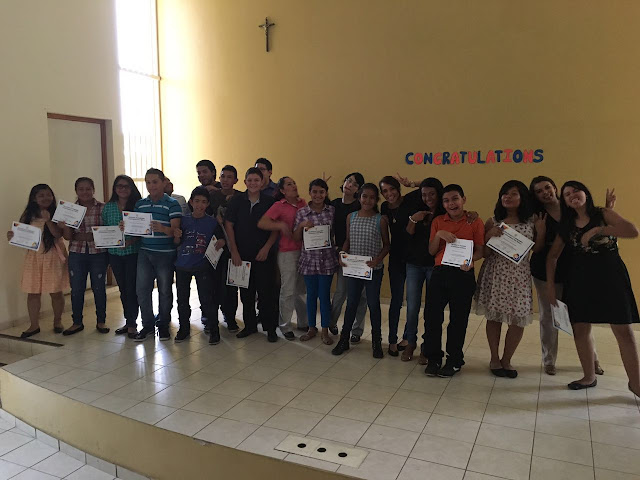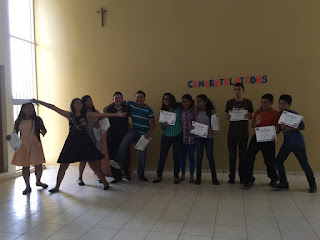 I am in my forth year of Languages at Universidad Don Bosco. I have studied many different subjects that have helped me to build my "personality" as professional. For example: Didactic I and II, Curriculum Development, Practicum I, Practicum II etc. I consider the last two as the most remarkable in my profession. I have had different kinds of teaching experiences: I have taught to children nine to ten years old at a college I worked for. I have taught at church to children from four to six, teenagers from twelve to seventeen and adults from eighteen to about seventy years old. Furthermore, I taught to children from eight to eleven years when I was studying Practicum I. But, the most recent experience I had was when studying Practicum II in which I had to teach to teenagers. I was an amazing experience and I really expected to learn and improve as much as possible.
I am in my forth year of Languages at Universidad Don Bosco. I have studied many different subjects that have helped me to build my "personality" as professional. For example: Didactic I and II, Curriculum Development, Practicum I, Practicum II etc. I consider the last two as the most remarkable in my profession. I have had different kinds of teaching experiences: I have taught to children nine to ten years old at a college I worked for. I have taught at church to children from four to six, teenagers from twelve to seventeen and adults from eighteen to about seventy years old. Furthermore, I taught to children from eight to eleven years when I was studying Practicum I. But, the most recent experience I had was when studying Practicum II in which I had to teach to teenagers. I was an amazing experience and I really expected to learn and improve as much as possible.
It was difficult when I was introduced a new framework named ECRIF (Encounter, Clarify, Remember, Internalize, Fluently use.) because I considered it really complex. the first lesson plan I did using this framework took me (you won´t believe it) about two days. Let me explain you why: I did the lesson plan the first time but changed it, I did it again and change it again. The second lesson plan took me less time and the third even less. But, planning a lesson was not the only difficulty I had. The real challenge for me was to teach what I had planned. I got nervous during the first class, but I would say it was good because I felt comfortable and confident with what I was doing. During the second one I felt really nervous and I could not control my nervousness. What make me feel nervous is that I know that I am being evaluated, it is not the students but the other teachers that I know they would notice if I do something wrong. For the third class, I was nervous but, I thought: "This is my class. I have the control of it. It does not matter if I change something from my lesson plan if it is needed to help students to acquire the language." Thinking this way help me face my nervousness. I truly enjoyed the class, my class.

As it was challenging for me it was to my classmates too. I am going to write about Eduardo, about the improvement he showed from the first to the last lesson. I could observed that he was nervous during the first class. He used little space in the classroom. During the second one he showed more confidence. But, during the last class he really made the class his class. I could not notice if he was nervous or felt unsure about something. I liked every activity he used in all the lessons, the materials and color of the materials. I liked the way he recycled materials, assessed students and lead them to freer use.
Finally, it was real challenge for me to plan and teach using ECRIF. Nevertheless, I improved a lot, I considered I achieved the objective of this course. I learned to plan using ECRIF, to teach using this framework, to be more confident when teaching. I learned to assess if students had understood or if I needed to go back and explain again or change the activity, etc.I learned to have more control of my nervousness, feel confident and the most important enjoy the class and the way students improve. Although I am not an expert I am ready to teach using ECRIF. Now I prefer to use ECRIF because is more student center and more flexible.


